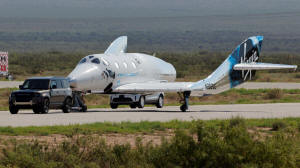Virgin Galactic makes key spaceflight test before starting commercial
service
 Send a link to a friend
Send a link to a friend
 [May 26, 2023]
By Joey Roulette [May 26, 2023]
By Joey Roulette
WASHINGTON (Reuters) -A spaceplane from Virgin Galactic reached the edge
of space on Thursday carrying a crew of six, making its first
spaceflight test in nearly two years as the space tourism firm founded
by Richard Branson prepares its long-awaited commercial service.
The company's VSS Unity spaceplane dropped from its twin-fuselage
carrier aircraft around 12:24 p.m. EDT (1624 GMT) over the desert of New
Mexico and blasted off to the edge of space seconds later at roughly
three times the speed of sound.
"Successful boost, WE HAVE REACHED SPACE!," Virgin Galactic wrote on
Twitter.
A live video stream from private video news group NASA Spaceflight
showed VSS Unity jetting away from its carrier craft, its sole rocket
engine leaving a trail of white exhaust as it climbed to an altitude of
roughly 54.2 miles (87.2 km), beyond the U.S.-recognized boundary of
Earth's outer atmosphere and space.
The spaceplane glided back to land at around 12:37 p.m., Virgin Galactic
said.
The company's Unity 25 mission, lasting roughly 90 minutes in all, is a
crucial final test flight before it flies its first commercial mission
in late June, hoping to carry out a mission roughly every month
thereafter.

The flight comes 22 months after billionaire Branson and employees rode
to the edge of space aboard its centerpiece SpaceShipTwo spaceplane.
Virgin Galactic had hoped that high-profile mission would open the door
to routine flights soon after.
[to top of second column]
|

Virgin Galactic's passenger rocket plane
VSS Unity is towed to the hangar after billionaire entrepreneur
Richard Branson and his crew, reached the edge of space, at
Spaceport America near Truth or Consequences, New Mexico, U.S., July
11, 2021. REUTERS/Joe Skipper

A safety probe into Branson's flight by the U.S. Federal Aviation
Administration delayed the plans, as did a lengthy spacecraft
upgrade period that lasted longer than Virgin Galactic anticipated.
Virgin Galactic pilots Jameel Janjua and Nicola Pecile piloted the
carrier aircraft, named VMS Eve, which dropped the VSS Unity
spacecraft at an altitude of 44,500 feet (13,563.6 m). VSS Unity
spent a few minutes in the weightlessness of space before gliding
back to land.
The test mission follows the type of rides Virgin Galactic intends
to provide for a backlog of some 800 customers. Most have paid
between $250,000 and $450,000 for a ticket.
The company in April conducted a successful glide test with VSS
Unity, dropping it at 47,000 feet for a free-fall back to its
runway, without having ignited its engine to go toward space.
Mike Masucci and CJ Sturckow piloted the spaceplane. In the cabin
was the company's chief astronaut instructor, Beth Moses, astronaut
instructor Luke Mays, senior engineering manager Christopher Huie
and Jamila Gilbert, internal communications senior manager.
(Reporting by Joey Roulette in WashingtonEditing by David Gregorio
and Matthew Lewis)
[© 2023 Thomson Reuters. All rights
reserved.]This material may not be published,
broadcast, rewritten or redistributed.
Thompson Reuters is solely responsible for this content. |